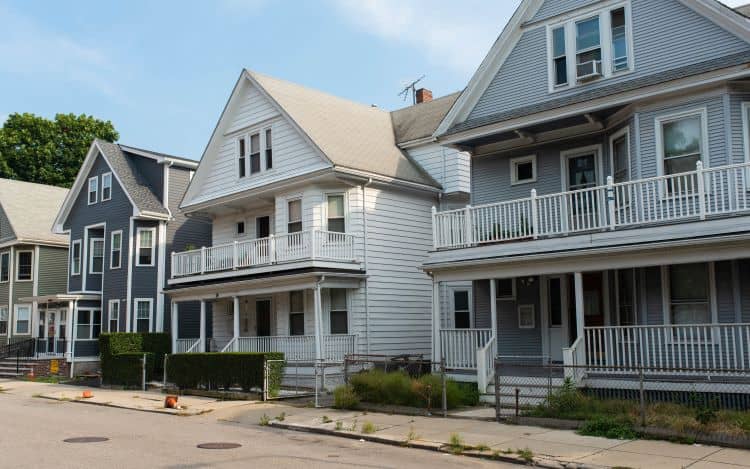
Greater Boston is one of the real estate markets with the highest property values in the country. Most homes are priced at over half a million dollars. As such, it is nearly impossible for most families to buy a home in Boston using outright cash, without the need for a home loan. When purchasing a home for sale in Boston, buyers need to be knowledgeable of not only the neighborhoods and the overall home-buying process, but also about the mortgage lending process. To help home buyers in Boston, we have put together a list of 10 mortgage terms that you should know beforehand.

Mortgage
This is the home loan you will need to use to buy a home in Boston or anywhere else. When you get a mortgage loan, you repay the mortgage over a predetermined period, usually 15 or 30 years, although there are many options including fixed or adjustable. The lender will hold the “deed” to your home until your debt is paid in full. Your home acts as collateral to secure the mortgage loan. If you default in your installment payments, the lender may repossess your home. The process by which this is done is a foreclosure.
Debt- to- income ratio (DTI)
This is a metric that helps lenders evaluate your ability to acquire new debt. The DTI ratio measures how your debt obligations fare in relation to your gross (pretax) monthly income. The lower DTI the better. A low DTI it is preferred by lenders because it shows that you make enough income to be able to afford a new mortgage payment. The Debt- to- Income ratio is calculated by adding up your monthly debt payments, then dividing the total by your gross monthly income. For a conventional home loan in Boston, borrowers typically look for a DTI below 43%.

Pre- approval
A mortgage preapproval should be the first step towards buying a home in Boston. During this preliminary process, the lender determines whether you are financially healthy enough to borrow from them. This analysis will likely include reviewing details from your credit report, your tax returns, and employment history. They’ll also want to know about any debts you hold, whether that is student loans or credit card debt. If you’re preapproved by the lender, you’ll receive a letter stating how much you’re pre-authorized to borrow. This will also include your expected loan terms such as mortgage type, interest rate, fees, etc. It’s important to note, however, that a pre-approval isn’t a promise that your loan will be approved. A formal mortgage application process will still be necessary before the home loan is issued.
Escrow
An escrow account is an account setup for the purpose of holding a payment made by one person until a specific condition has been met. In this case, that condition would be your purchase agreement. This type of account can be a considered a legal arrangement meant to protect both buyer and seller. There are two primary uses for escrow accounts in the homebuying process. The first is to hold your “earnest money” deposit that shows the seller you are serious about buying the property. Money is held in escrow in case issues are revealed during inspection and you need your money back (see: contingencies). The second applies once you’re already a homeowner, and is used by your mortgage lender to pay property taxes and/or homeowner’s insurance.

Down payment
This is the money you pay upfront toward the initial purchase of your home in Boston. Mortgage lenders generally prefer – and can even require – a substantial down payment. This is how new homeowners can show that they are financially healthy and invested in the purchase. The down payment is typically due upon completion of the closing paperwork for your mortgage. New homebuyers often think they need 20% down buy a home in Boston. However, FHA loans (federal loans) make it possible to buy with a lower down payment of just 3.5%, for example.
Interest Rate
The interest rate cited by your mortgage lender is the annual percentage that a lender will charge you to borrow money. If you have a fixed-rate home loan, the interest rate will stay the same for the entire length of the mortgage. An adjustable-rate mortgage works differently. You’ll likely have a “better” interest rate for a set amount of time. After that set time, it can change from one year to the next. The interest rate cited in your mortgage note is part of the annual percentage rate (APR); but they are not the same thing.
Annual Percentage Rate (APR)
The term APR is meant to reflect the total cost to you of borrowing money. It’s different from your mortgage interest rate because the APR also includes additional costs and fees. These costs include loan origination, mortgage insurance and other fees, plus any “points” you may have to pay upfront to receive a lower interest rate. By comparing the loan’s APR to its interest rate, you can learn how much of your costs will be interest charges, and how much will be other fees. When you receive a home loan document from a mortgage lender, the interest rate will be typically listed on the first page, under “Loan Terms.” The APR will likely be found on page three under “Comparisons.”

Contingencies
This is a widely misunderstood term. A contingency, in the case of a home buying experience, means that the home buyer can stipulate certain requirements to be met by the seller. If these conditions are not met, the offer is not considered agreeable. The offer is, therefore, “contingent” upon the seller meeting said requirements. For example, you may request as a contingency that you will only buy the new home in Boston after it has passed an inspection. Another common contingency is the option to cancel the deal if your home loan doesn’t get approved.
Mortgage Insurance
This is a type of insurance that covers the risk of you defaulting on your home loan. When your home has mortgage insurance coverage, the insurance company will cover your mortgage payments if for any reason you default on your mortgage and stop making payments. If you don’t have 20% to put down, chances are you’ll be required to take out mortgage insurance. Different requirements may apply depending on your down payment, the equity in your home, and whether it’s a federally backed mortgage. Private mortgage insurance (PMI) is typically required for conventional home mortgages until the home equity equals or exceeds 20%.

Mortgage Note
This is the mortgage document you will need to sign at closing. The note outlines the amount of the loan, as well as the specific terms of your home loan mortgage. These terms can include the interest rate, whether it’s fixed rate or adjustable, and more.
If you’re looking to buy a home in Boston with a mortgage, it’s important to truly understand the terms you’re agreeing to. After all, these are terms you’ll have to honor for 15-30 years. The mortgage terms outlined above are the terms we get the most questions about, or that are often misunderstood. Stay tuned for more terms you need to know before purchasing a home in Boston! Let us know if there are other terms you have questions about. For more information on the Boston real estate market, reach out to one of our real estate specialists at (617) 208- 2121.
Boston Pads has the largest collection of real- time Boston homes for sale in the area. We take the guesswork out of finding your dream home by helping you get the most valuable real estate information you need to make a wise decision.

Demetrios Salpoglou
Published November 30, 2021
Demetrios has pulled together the largest apartment leasing team in the Greater Boston Area and is responsible for procuring more apartment rentals than anyone in New England – with over 130k people finding their housing through his services. Demetrios is an avid real estate developer, peak performance trainer, educator, guest lecturer and motivational speaker.










